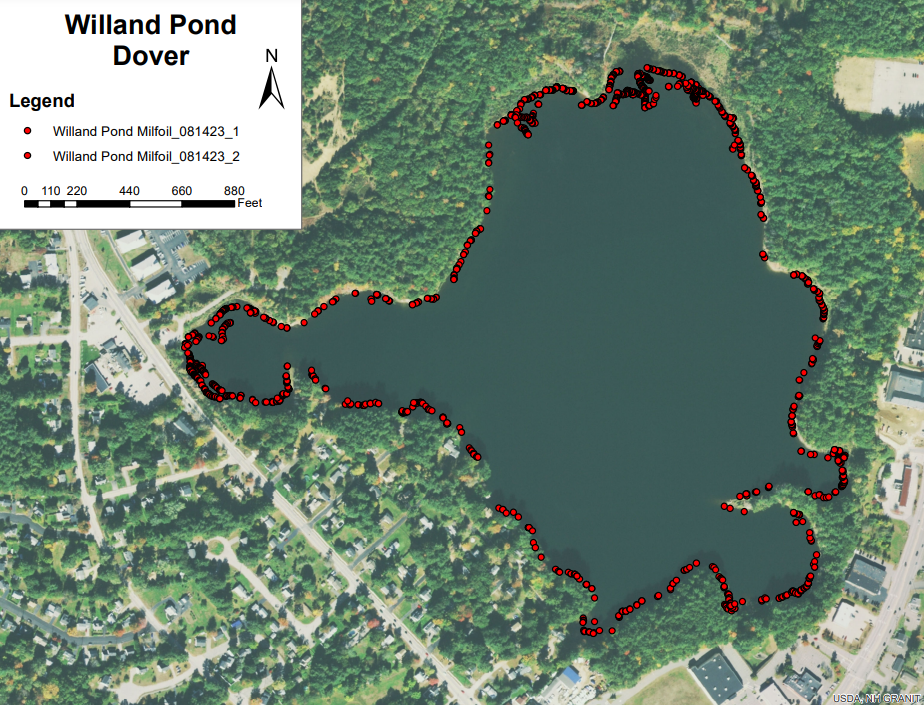Milfoil in Willand Pond in Dover to be treated with herbicide. Some counselors dissent.
DOVER — Willand Pond will be treated with herbicide to remove milfoil, an invasive plant species that ruins ecosystems, using a New Hampshire Department of Environmental Services grant that will be matched by the city.
A grassroots effort from Dover residents to clean up the pond ended in a successful vote by the City Council to match and expand the state-designated grant, though not before the members initially voted down the proposal due to concerns about post-treatment water quality.

Citizens group Friends of Willand Pond received a commitment from the state Department of Environmental Services for a $14,140 grant to get rid of milfoil at Willand Pond. However, due to the group not being a registered organization through the Secretary of State’s office, the Department of Environmental Services suggested the grant go through the city of Dover, which shares the shoreline of the 66-acre freshwater pond with Somersworth.
Under the proposal, Dover would match the Department of Environmental Services’ contribution, bringing the total amount allocated to the milfoil removal to $28,280. The herbicide that was recommended by the Department of Environmental Services for Willand Pond is PROcellaCOR, deemed a reduced risk management practice.
“While the City has two water supply wells near the shores of Willand Pond, these can be deliberately shut off for a period of time following the herbicide treatment,” the city’s resolution states.
The herbicide came under fire during the meeting, with one city resident sounding the alarm the herbicide may contain elevated levels of per- and polyfluoroalkyl substances (PFAS), manmade “forever chemicals” that are unsafe for consumption through drinking water.
Cynthia Walter, a retired scientist living in Dover with a Ph.D. in biology, flagged the proposed pond herbicide as a potential risk, suggesting a dive team should be used as the primary means of removing the milfoil.
The Department of Environmental Services’ proposed plan to use the herbicide had previously been unanimously approved by the city’s conservation commission in early March.

“The amount of this herbicide that would normally be used in this circumstance would be 1,000 times higher than the drinking water limit for PFAS,” Walter said Wednesday. “So here you are approving of using something in a drinking water pond that would be 1,000 times more PFAS than we ever should have anywhere near a drinking water supply.”
“We don’t need it,” added John Atherton, Walter’s husband. “We can get the job done perfectly well by having the divers and volunteers taking it (the milfoil) out by mechanical means.”
Other public commenters opposed their point of view, advocating for the herbicide’s use and pointing to the condition of the pond as needing treatment.
“The herbicide, to me, presents more acceptable risk than hoping we can pull enough of it to prevent milfoil from killing Willand Pond,” Dover resident Melissa Valego said.
“I am not excited about using the herbicide, but I feel from a management standpoint we’ve hit a tipping point that something needs to happen because I think the milfoil is indicative of overall decaying health of the water quality, and I really worry about cyanobacteria blooms and other water quality problems,” said John Storer, the city’s director of community services.
Speaking on behalf of the Department of Environmental Services, Peter Beisler, senior aquatic specialist at SOLitude Lake Management, noted six gallons of the herbicide would be used in the affected area of Willand Pond in Dover.
The motion to approve the grant, have the city match it and spend the funds on the herbicide treatment originally did not pass, failing to receive the necessary two-thirds majority vote from the nine-member City Council. Deputy Mayor Dennis Shanahan was not present for the meeting, and three councilors - Debra Hackett, April Richer and Robert Warach - voted against the motion, while the remaining five councilors were in favor.
Some members of the council were unaware that the vote would fail without receiving a two-thirds majority vote, thinking it would pass on only a simple majority, leading to a review of parliamentary procedure by city attorney Joshua Wyatt.
Hackett called for the plan to be taken up in a second, reconsidered motion to change her vote.
“I don’t want these people who worked so hard to get that kind of failure,” she said of the citizens’ group. “I don’t know what's going to happen. I still am a little nervous about this but after seeing the outcome, I don’t want to appear wishy-washy, because I came into this wishy-washy. I really have mixed feelings about this.”
The City Council then approved the herbicide treatment plan on a 6-2 vote, with Richer and Warach again in opposition.
Richer and Warach were steadfast in their stance, stating fears of potential PFAS being willingly put into the Willand Pond water supply.
“I appreciate the work that the public put into the project, but I still don’t think that makes it right to put forever chemicals into the water supply,” Warach said.
“I think that the volunteers have done an amazing job, and it does break my heart to want to vote against them because I think that this is what we need in the community, people who are going to step up,” Richer said.
A long-term management plan for Willand Pond crafted by the Department of Environmental Services calls for a resident “weed watchers” group to monitor the pond, with divers possibly being deployed to hand pull more milfoil in 2025.
This article originally appeared on Portsmouth Herald: Dover OKs herbicide use against invasive milfoil in Willand Pond
